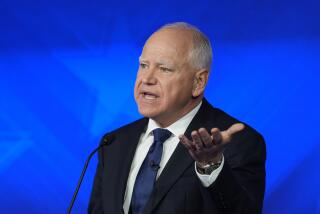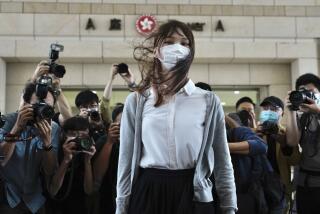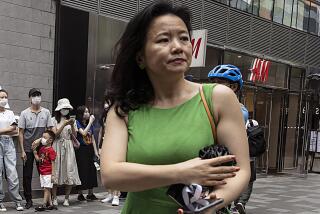China Dissident to Stay in Hong Kong
- Share via
HONG KONG — Almost all of China’s 1989 Tiananmen Square dissidents who received asylum in Hong Kong have slipped out of the colony before their political oasis evaporates at midnight June 30. One who decided to stay is Han Dongfang, 34, the exiled founder of China’s independent labor movement.
From here, he secretly distributes his China Labor Bulletin to factories across the border and does weekly broadcasts on Radio Free Asia to encourage mainland workers to improve their conditions. His presence in Hong Kong will test the incoming leaders’ tolerance of post-hand-over dissent.
Han says he’d rather be pushing the limits inside China, but after getting out of prison there, he can’t get back in--to the country or even to jail.
After being infected with tuberculosis during the two years he spent in prison for leading worker protests in Tiananmen Square, he was sent to the U.S. to have half of one lung removed. When he tried to return to China, police threw him--literally--back across the border rather than have him stirring up trouble inside the country.
Now he’s waiting for China to come to him. “After the 1st of July, I will be back in China without even moving,” he says with a smile.
Why does he want to go back to the place that imprisoned him, tortured him and threw him out? “I don’t want to go back because I love the country,” Han says. “There’s nothing to love--it’s a machine with no feelings. I want to go back because I love the people.”
To watch him engage a crowd with his soft-spoken wit and finely honed arguments, to see his charisma cajole folded arms into handshakes, is to understand why China considers him so dangerous.
Han was born into a poor family and became a soldier, a railway worker and, now, a persuasive organizer. The Chinese leaders fear him because he appeals to the workers in factories and on farms as much as to students and intellectuals, giving him a much wider potential following than almost any leader.
“I’m no threat to the Chinese government,” he insists, saying he could be helpful in resolving the volatile labor unrest that accompanies China’s growing layoffs of state workers, if only it would let him try.
“Many of the problems are not with the government. Many of the problems are with ourselves,” Han says. “We don’t know what we want. We don’t know how to ask for it.”
On his radio program, he starts with the basics. “I tell the workers: Think about yourself and what you need,” he says. “If it’s too hot in the factory, ask for air conditioning. Start democracy with a fan.”
Eight years after the grand demands for democracy in Tiananmen Square ended in tragedy, Han offers a sober evaluation of what went wrong.
“Tiananmen was a historical misunderstanding,” he says. “At that time, nobody knew what they wanted, including the students and workers--including myself. It was an unripe fruit.”
Now he is planting the seeds of choice and responsibility around China while he can. The Hong Kong government has granted him a temporary permit to stay until August 1998. But incoming Chief Executive Tung Chee-hwa warned earlier this week that Hong Kong is not meant to be a dissidents’ haven, and for special cases like Han, “when their time is up, they will have to go.”
Han says he is prepared to be arrested even before then. “The Chinese government will find it necessary to take some cases to warn others--to kill a chicken to scare the monkeys.”
In the end, Han may be forced to seek asylum elsewhere. But he says he will keep helping Chinese workers improve their lot, no matter where he is. “First of all, I am a trade unionist,” Han says. “Secondly, I am Chinese.”
Last of all, he says, he is a politician. “I never want to do that,” he says. “I don’t have the right character.”
He dismisses frequent comparisons to Lech Walesa, Poland’s Solidarity labor leader who eventually became the country’s president.
“I’m sure if one day I became the president of China, I would be the same kind of person as Mao Tse-tung,” he says. “After two years in jail, after I lost my lung, I’m afraid something inside my heart is very bad. I’m not strong enough to resist [the impulse toward] revenge.”
More to Read
Sign up for Essential California
The most important California stories and recommendations in your inbox every morning.
You may occasionally receive promotional content from the Los Angeles Times.










